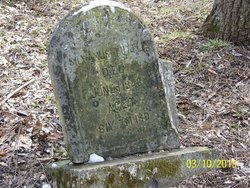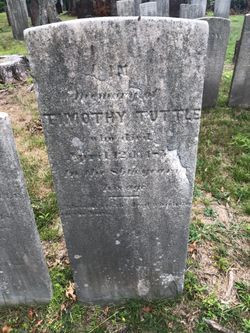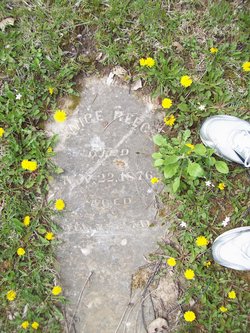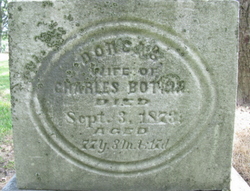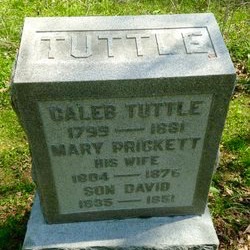| Description |
: |
Son of Thomas and Mehitable Fairchild Tuttle.
BIOGRAPHY TWENTIETH CENTURY History of SPRINGFIELD AND CLARK Co.. Ohio by Rockel, c. 1908:p. 707
Sylvanus Tuttle is one of the notable pioneers of Clark Co.
The History of this pioneer ancestor of the Tuttles is so typically representative of that of the best class of early settlers in this section that a sketch of it may here be given, condensed slightly from an historical article written by the subject of this notice, Mr. Harvey H. Tuttle.
"Soon after the glad ending of the long struggle for liberty in America, a stalwart young man decided to...
Read More
|
Son of Thomas and Mehitable Fairchild Tuttle.
BIOGRAPHY TWENTIETH CENTURY History of SPRINGFIELD AND CLARK Co.. Ohio by Rockel, c. 1908:p. 707
Sylvanus Tuttle is one of the notable pioneers of Clark Co.
The History of this pioneer ancestor of the Tuttles is so typically representative of that of the best class of early settlers in this section that a sketch of it may here be given, condensed slightly from an historical article written by the subject of this notice, Mr. Harvey H. Tuttle.
"Soon after the glad ending of the long struggle for liberty in America, a stalwart young man decided to try his fortune in the new west. He had seen service as a New Jersey 'minute man' at the battle of Monmouth, and no doubt at other places. It was his duty as a 'minute man' to be ready to respond to any call the cause of liberty might make on him within the limits of New Jersey Colony. He had three older brothers, two of whom, at least, were with the patriot army under General Washington. One lost his life while crossing the Hudson River above the city of New York while in the service. The other served in the army seven years and received a pension of $60 per annum during life.
"But the subject of our sketch, a rugged young man, six feet in height, thought of the western country. He loved a comely maiden named Mary Brown. She was of medium height, with dark eyes and hair, and rosy cheeks, the very picture of endurance and hardihood. She too was inclined to tempt fortune in the wilds of the west. So Sylvanus Tuttle and Mary Brown were united in marriage about the year 1784.
"They soon started for the west, having as their objective point southwestern Pennsylvania. Starting from Morristown, New Jersey, they would cross the upper Delaware River, and most likely go to Harrisburg, at which point they would intersect the great wagon road from Philadelphia to Pittsburg. The route was a veritable thoroughfare for the multitude of imigrants to the west to the West. Probably the young wife rode the single horse they owned, the same horse carrying a few articles of clothing and some cooking utensils. They may possibly have had a second animal which served to carry the young husband. However this may be, we may be quite sure that only the veriest necessities would be carried with them, since neither of these young people had much or worldly goods.
We can be sure of but one article, viz: the rifle which young Sylvanus carried at the battle of Monmouth. This heirloom has been kept in the Family, and is now in the possession of James T. Tuttle, a great grandson.
At what point in western Pennsylvania the first home was built we do not know now, nor do we know the exact period of time spent here. But while here, Thomas Tuttle, the father, visited them, and remained with them until they finally decided to go down into Virginia, when he returned to Morristown, New Jersy.
"The new location was in the vicinity of Clarksburg, Virginia, now West Virginia. Here they remained for fifteen or sixteen years. Here most of their children were born. Here the older received their education, for all of them could read and write, and the boys, at least, were very apt and skillful in arithmetic. But here also they were trained in industry and frugality, in the hardihood and self-reliance, acquirements that became exceedingly useful in afterlife.
Here also in some quiet fertile valley, the Family gradually accumulated something of this world's goods. In those times the clothing and food were all prepared in the home, the clothing from the wool of a little flock of sheep and from flax which they grew. The men would shear the sheep, then the mother and the girls would manufacture the wool into clothing, often displaying much skill and ingenuity in the colors and patterns of the flannel cloth. In like manner, after the flax was pulled and broken and skutched to remove the outer bark, it would be turned over to the women for manufacture.
Thus we can easily understand how the oldest, a girl named Eunice, became exceedingly skillful at the spinning-wheel and loom, not only in duplicating a pattern of cloth she might chance to see, but even in inventing new ones.
"But here in their quiet home in Virginia, the rumors of the rich valleys and fertile lands of the Ohio country reached them. Perhaps some adventurer who had been there would tell of its beauty and fertility in such glowing terms as to awaken a desire to find a home there. Most probably they were renters of a farm from some large land-holder in Virginia.
Then in the ordinance of Congress, passed in 1787, by which all the country northwest of the Ohio was admitted to the Union, ample provision was made for free public schools in setting apart section 16 in every township for school purposes. These advantages, with the growing need of their now large Family, induced Sylvanus Tuttle and his wife to again try the fortunes of the Ohio country where the government was selling such beautiful and fertile lands at merely nominal price and on most advantageous terms.
"December 22, 1803, the eldest daughter, Eunice, was married to a man named Morris Reece. When grandfather and grandmother decided to emigrate to Ohio, Mr. Reece and his young wife decided to be of the company. So the preparations for the journey went forward. Grandmother did not forget that they were going to a new wild country, so she took with her all kinds of garden seeds, apple seeds, and peach seeds to plant at the new home. The trees in the old orchard, now quite gone, were grown from the apple seeds brought from Virginia.
There were besides the Tuttle and Reece families, two other families, by name Robey, who made the journey together. "There were in the Tuttle families the father and mother, six boys, two girls, besides Mr. and Mrs. Reece. They brought a flock of eighteen or twenty sheep and two or three cows. The sheep were in the charge of the seven year old boy Caleb.
There course would bring them through Marietta, Ohio, a distance from Clarksburg of eighty or ninety miles. The road would be over rough mountain trails called roads. The roads were so steep that often it would be necessary to chain saplings or small trees to the real axle of the wagons to hold them back so the teams could guide them down the steep inclines. All the way they camped out along the roadside. At Marietta, one of the older boys, Thomas, took sick with a malignant fever, and the journey was delayed two weeks, the families encamping and the sick boy and his nurse finding accommodation with some hospitable settler. It was necessary for the little seven-year-old Caleb to go a few miles in advance to find accommodation for his flock. Here he stayed with the sheep until the journey was resumed. After the sickness of two weeks Thomas died and was buried among strangers in some lonely spot not far from Marietta. Then with sad hearts the parents, brothers and sisters resumed their journey.
The next town of any importance would be Athens, the seat of Ohio University, and the next place would be Chillicothe, then the capital of the new state. The from Chillicothe to the vicinity of Springfield, over the old Chillicothe road, now the South Charleston Pike.
When they reached the vicinity of Springfield, they encamped the first night on the spring branch in front of the old Ried homestead, not far from Reid's schoolhouse.
"The arrival in what is now Clark Co.. was probably about the last of October, 1806. They finally located along Buck Creek, about six miles East of New Moorefield, and near Catawba Station on the Delaware branch of the C.C.C. & St. Louis Railway.
The Tuttle and Reece families located near each other on lands belonging to Mr. Van Meter, a large landowner in this region. Here they spent about a year and a half. The first winter would be the hardest. They had no wheat and only what corn and other provisions they could buy, and we may be sure that money was a scarce article with these new settlers and must be carefully husbanded to secure land from the government on which to build up the new home. But they would not lack for meat. Morris Reece was a marksman of wide repute in his old Virginia home, and as game was quite plentiful, he was able easily to provide both families with abundance of meat. It was an understanding between the two families that whenever Morris Reece's rifle was heard to crack there would be meat to be had, generally bear meat or venison.
Grandfather and the two older boys would possible find some employment with the rich VanMeter, in flailing out his crop of wheat getting their wages, it may be, in corn or sometimes wheat. "To get the meal or flour they would probably have to go to the little grist mill of Simon Kenton at what is now the Lagonda suburb of Springfield. This mill probably passed into the hands of Nicholas Prickett a year or two later.
"Mrs. Van Meter was a kindly disposed woman, and would bring her coffee grounds to grandmother that she might get a mild sort of coffee from them for her Family. Grandmother would quietly take them, but her pride of independance would not suffer her to use them when there was not a special need or benefit to be derived. So when Mrs. Van Meter was gone she would throw out the grounds. They contented themselves with mush and milk, corn pone, bear meat, and venison, and towards spring they could have a refreshing drink from the tea of the fragrant spice bush, and the sassafras root. As the spring drew on they would be busy making a little sugar from the sugar tree, for they lost no opportunity to provide the necessaries and as many of the luxuries of life as their own labor could secure.
"The spring would find all busy. Grandfather and the boys getting in a crop of corn and flax from which to manufacture tow and linen garments. The potato crop, too, would not be forgotten. We can readily imagine that as soon as possible a garden would be planted under the care of the women and younger boys. Then as soon as the sheep were shorn would come a busy time for grandmother and the girls. The wool must be scoured, carded into rolls, spun into yarn, dyed and woven into cloth to make garments for the Family.
The previous winter May have been long and tedious, but the summer was busy and fleeting. "However busy they were, grandfather did not forget the one object they had in view in coming to the wilds of Ohio, viz. to secure a home. He selected a quarter section of land on the Sinking Creek, about one and a half miles above its mouth. Here was water for the home and for cattle, and yet only a small part of the land was crossed by the stream. Here, too, was a fine sugar bush, so fine as to attract the attention of some wandering tribes, who came every spring in February and March to make sugar, encamping along the creek.
"Others, however, looked with longing eye on this fertile quarter section, and grandfather and grandmother soon decided that if they secured the land they would have to use strategy. Grandfather and the older boys were busy at home. Who then should make the journey to Cincinnati, where the nearest government land office was located, and enter the land? The lot fell upon Caleb, the eight-year-old boy who had shown himself so efficient and self-reliant the previous year in caring for the sheep throughout the long journey from Clarksburg.
Secretly he was equipped for the journey. Plain and explicit instructions were given him as to the number of the range, section, etc. Fifty dollars in gold were securely fastened to his sturdy little body. Thus equipped he set out on one of the old horses for Cincinnati. In a few weeks he returned, having correctly entered the land, and bringing a receipt for the first payment, which also described the land. It is not difficult to imagine that our grandparents were exceedingly relieved of anxiety and much gratified at the result of their scheeming.
Another winter was passed in the Van Meter cabin. Then when the winter began to wane, the two older boys were sent to the future home to cut the timber for the log cabin, and to clear some land for the next season's crops. They built a sort of tent or hut for a temporary shelter, and for weeks spent their entire time at work of chopping, burning brush, etc. returning home Saturday evening to spend Sabbath with the Family.
Soon the indians came for their usual spring sugar-making. Sometimes the boys would go down to the Indian camp in the sugar bottom to while away an evening with the Indians and engaging in their passtimes.
"When the early spring came, the logs for the cabin were all ready and at an appointed day the neighbors came from far and near, and by sun-down the cabin was up and under roof and chinked, ready for the mud plaster on the cracks between the logs. The a capacious but rude chimney was built, the lower part of nigger-heads or boulders laid in Clay mortar, the upper part of Clay and sticks.
"In a year or two a new house was built. This one is hewn of logs, and two stories high, with two large rooms on the ground floor. This house, when completed, was a palace compared with the cabins in which they had found shelter hitherto. Here were celebrated weddings and infairs - as receptions were then called - and here the young people gathered for merry-making such as husking-bees, etc.
"In 1812, October 30, the eldest son was married to a Miss Ellsworth; one of a Family in the settlement; and on December 31st of the same year the second daughter married Aguilla Ellsworth of the same Family. October 7th, 1813, the remaining daughter married Charles Botkin, and settled a few miles East of the homestead.
In the meanwhile the eldest daughter, Eunice Reece, had buried her husband, and with her two children, found a home with her parents.
During the War of 1812 with England, the two oldest boys were in the service for a short time, guarding a supply train which brought provisions fro the army under General Hull.
February 23, 1815, John Tuttle married Margaret Prickett, a daughter of Nicholas Prickett, who some years before had brought his Family from Cleremont Co.. and settled at Lagonda. He purchased the grist-mill of Simon Kenton, which he improved and ran as long as he lived.
In the year 1822, March 21st, Caleb Tuttle married another daughter of this miller's Family, Mary Prickett.
In the spring of 1816 a Baptist Church was organized in the community, one mile south of the Tuttle homestead. Nicholas Prickett was one of the founders. From the Records we learn that Sylvanus Tuttle was received into membership in this church in October, 1816, and in November Mary Tuttle became a mamber. They could have preaching service but one each month, and at these services, which were held both Saturday and Sunday, one or more were received into the little church. A few years later Sylvanus Tuttle was elected to the office of deacon in this church in which capacity he served until his Death.
In the year 1821 the present brick dwelling-house was built. The bricks were made and all the material for the house was gotten from the farm except the hardware and lime for the mortar.
As the years went on, one by one, the children, as children Will, formed homes elsewhere. Then came grandchildren to live with and help the grandparents in their old age.
In these early years all the wheat or rather the flour must be hauled all the way to Cincinnati for market. To get a little money was very difficult and money was very scarce. The people lived in a plain, simple manner. Salt was one of the most difficuly articles to obtain, and had to be hauled from Cincinnati or Sandusky. There were no roads at that time worthy of the name, and bands of hostile Indians were ready to shoot any white man who might unwarily fall in their way.
Sylvanus Tuttle died on January 1, 1843, at the good age or eight-one years, seven months, and nineteen days; and Mary Tuttle, his wife, died May 26,1848, aged eighty years, eleven months, and nine days."
|

